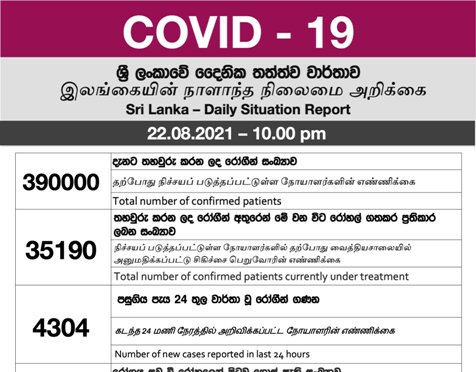COLOMBO – Sri Lanka’s COVID-19 data are accurate and responsibly compiled to avoid duplication top health officials said after their numbers were questioned as cases appeared to rise by 8,647 in a single day.
The wide use of rapid antigen tests, the same person being tested more than once by different labs or over a period, is complicating data compilation, officials said.
Data provided by Sri Lanka’s Health Promotion Bureau showed the total cases as of August 20 to be 381,812, up from 373,165 the previous day, suggesting there had been 8,647 new COVID-19 patients detected on August 20 alone.
However, the daily new positive cases showed the total detected cases on August 20 were 3,839, raising concerns over the unexplained 4,808 patients included in the official data on that day.
“We always take Epidemiology Unit database and take the same numbers,” Dr. Ranjith Batuwanthudawa, the Director of the Health Promotion Bureau of Sri Lanka, told reporters Sunday (22), when asked about the discrepancy.
Samitha Ginige, Acting Director, Epidemiology Unit, said the data were compiled responsibly and after verification, but the dynamics of the disease and the caseloads along with duplications have put pressure on the accuracy.
“It is impossible sometimes or it is not practical with a huge increase of caseload,” Ginige told reporters when asked about the possibility of the data error.
“It’s a very complicated system. You have to understand that’s why sometimes people raise unnecessary issues about data.”
The government’s COVID-19 data has been questioned by the opposition in Parliament and some legislators have alleged that the data are manipulated to show an underestimated number of deaths and cases.
Ginige said there could be many reasons for problems with numbers. “Sometimes there are duplications,” he said. “If one person gets positive, they also subsequently give the sample to 2-3 other laboratories. Sometimes they are getting different results. So, we have to sort it out then and there.”
“Certain sites which get information directly from laboratories might publish them as new cases. But for us, we have a responsibility. At the national level, we have to sort out those things.”
The rapid antigen test and the same person being tested over a period, could be a reason for the data errors.
“With the introduction of the rapid antigen, a large number of authorized laboratories as well as certain GP practices and even small-scale practices are now widely doing tests all over the country,” Ginige said, acknowledging there was no proper mechanism to get the results.
Ginige did not elaborate specifically on the August 20 data error.
Cabinet spokesman Dullas Alahapperulma last week said the newly appointed health minister KeheliyaRambukwella will look into alleged manipulation of data related to COVID-19 deaths and cases after regional data showed significant discrepancies with national data released by the health ministry.
-economynext.com


